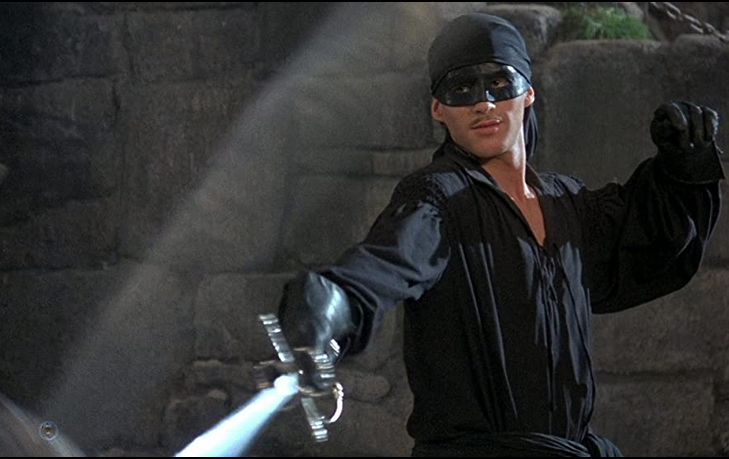The Princess Bride (dir. Rob Reiner, 1989)- Review
Download The Princess Bride screenplay for personal, private use.
“It's just that masks are terribly comfortable. I think everyone will be wearing them in the future.”
Little could mustachioed Old Harrovian Cary Elwes know, as he uttered that memorable line on location by the Cliffs of Moher in 1986, that he would be discussing it on CNN during a pandemic 34 years later. The enduring cultural sway of The Princess Bride, a pastiche fairytale adapted by William Goldman from his more cynical book, stems in a large part from its endless quotability - its torrent of snappy, adaptable comments on everything from “true wuv” to “land wars in Asia”.
As Christopher Guest (who played villainous polydactyl Count Rugen) observed, “so many (actors) had great turns to do… you look at the richness of these parts and virtually everyone gets to do something that's memorable in the movie.” The irreverence with which the film lurches between suburban Chicago and Pythonesque courtly Europe - between self-conscious, modern irony and ardent sappiness - makes for a memorable spectacle indeed, blurring swordfights with SNL-style banter for a kaleidoscopic, timeless riot.
Rudy Giuliani and Melania Trump at the RNC (2020 colourised)
Goldman’s original 1973 novel skewered the illusory refuge of fiction, burying the fairytale narrative beneath thick layers of bewildering sarcasm and faux-autobiography. Using the framing device of the authorial persona (licentious middle-aged screenwriter William Goldman) seeking a copy of the titular fairytale for his despised son, the novel intersperses the narrator’s mid-life crisis in LA with extracts of the ‘book’ by fictional author S. Morgenstern, and exchanges with the book’s editor, in an orgy of postmodern pessimism. Yet somehow, Goldman’s screenplay adaptation effected a schizophrenic shift in character, which, in the hands of director Rob Reiner, became a wry, gentle piece of swashbuckling escapism, with something to appeal to viewers of every age (and every level of disillusionment).
Following in the path of Monty Python’s Life of Brian (and paving the way for Shrek), The Princess Bride parodies the fervent sincerity of antique narratives common to early cinema: medieval princes, warty alchemists, and Errol Flynn facial hair are grafted into a hodgepodge of fantasies ancient and modern. Replacing the grouchy pseudo-authorial interjections of Goldman’s novel - including his persistent bullying and fat-shaming of the ‘Goldman’ narrator’s (thankfully fictional) son - the film deploys the more benign framing device of a kindly, eccentric grandfather reading ‘The Princess Bride’ to a cynical modern grandchild. The youth proxies the skepticism of a 1989 audience with sarcastic voiceovers, but gradually warms to the story, easing the generational divide. Indeed, the key structural device - slightly sappy fantasy narrative, modulated with knowing wisecracks - has characterized almost every big-budget family film since, appealing both to viewers young enough not to be cynical, and to those old enough to be paying for the tickets.
The film groans under the weight of hairbreadth escapes, dazzlingly beautiful heroines, heart-crushingly cruel villains, cliff-top duels over raging seas, wizards with bargain miracles, pirate galleons, deadly swamps, sadistic six-fingered counts and a gallant, daring threesome who only need to yell "All for one! And one for all!" to be mistaken for the Three Musketeers.
The plot is consciously prototypical: a farm maiden turned princess (Robin Wright) finds herself kidnapped back and forth, entrapped by the vile Prince Humperdinck (Chris Sarandon), pursued by her lover Westley (Cary Elwes) and her kidnappers-turned-rescuers Inigo Montoya (Mandy Patinkin) and Fezzik (Andre the Giant). Despite being a family-action film of the 80s, The Princess Bride skirts elaborate action sequences in favor of deeper characterization through dialogue (although it does feature two thrilling sword fights). Thanks to Goldman's script and Reiner's comedic chops - the Spinal Tap director finally got the project off the ground after overtures from Francois Truffaut and Robert Redford - the film draws good-natured humour from the tensions between youth, age, and disenchantment.
Áine Kennedy is a London-based writer and manager of the ScriptUp blog.






